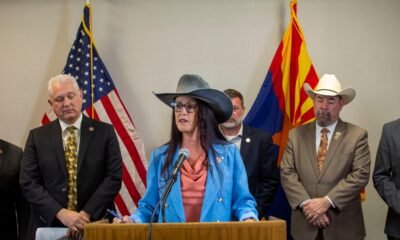2024 election
Judge Questions GOP’s Neutrality in Abortion Ballot Summary Dispute

Whether the phrase “unborn human being” will appear in the voter description of the Arizona Abortion Access Act is now a decision resting in the hands of a Maricopa County Superior Court Judge.
The legality of the term was debated in a tense Tuesday afternoon hearing. Attorneys representing the abortion rights ballot initiative clashed with GOP lawmakers who included the phrase in a voter information pamphlet. Arizona law requires impartial descriptions of every ballot measure to be sent to voters before an election. The inclusion of “unborn human being” is at the center of this legal dispute.
Dr. Patricia Habak, a local OB-GYN, testified for the Arizona for Abortion Access campaign. She argued that “unborn human being” is not a medically accurate term. The campaign has formally requested that the term be replaced with “fetus,” which they claim is more accepted and neutral. Habak, with over 20 years of experience, stated she has never used the term “unborn human being” in her practice or seen it in medical literature. She emphasized the importance of precise language, noting that “fetus” and “embryo” have clear definitions in the medical community.
Attorney Kory Langhofer, representing the GOP lawmakers, challenged Habak on the grounds of medical accuracy. He inquired whether any formal medical policy exists that labels the term “unborn human being” as inaccurate. Habak admitted there isn’t such a policy. Langhofer questioned if “fetus” is the best choice of words, pointing out that it can refer to any mammal, not just humans, a point debated during the Legislative Council meeting.
Republican lawmakers maintain that “unborn human being” and “fetus” describe the same entity, making them both accurate. Langhofer pressed whether the terms can be synonyms. Habak responded that the appropriateness of the terms can depend on personal beliefs, adding that the term’s usage could be influenced by individual values.
The GOP attorneys argue that their use of “unborn human being” is unbiased since it references an existing law. Arizona requires an impartial summary but also allows examining a ballot measure’s impact on current laws. If the Arizona Abortion Access Act passes, it will override the current 15-week gestational ban, which also uses the term “unborn human being,” allowing abortions up to 24 weeks of fetal viability.
In his final remarks, Langhofer asserted that the summary quotes existing law and warned that rejecting this phrase could invite endless future legal challenges. Judge Christopher Whitten noted the argument that quoting statute ensures accuracy but questioned if accuracy equates to impartiality.
Langhofer argued that the phrase’s inclusion doesn’t need to be unbiased for the summary to be considered impartial. He stated that while creating “impartial” descriptions is mandated, no law requires lawmakers to write neutral statutes. Thus, quoting an existing, albeit biased, law in a summary might still fulfill the impartial requirement.
Judge Whitten aims to issue a ruling by the week’s end, leaving both sides waiting anxiously for the verdict.


















